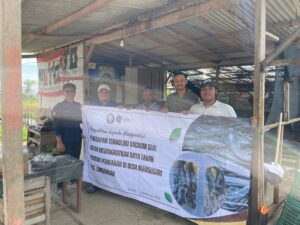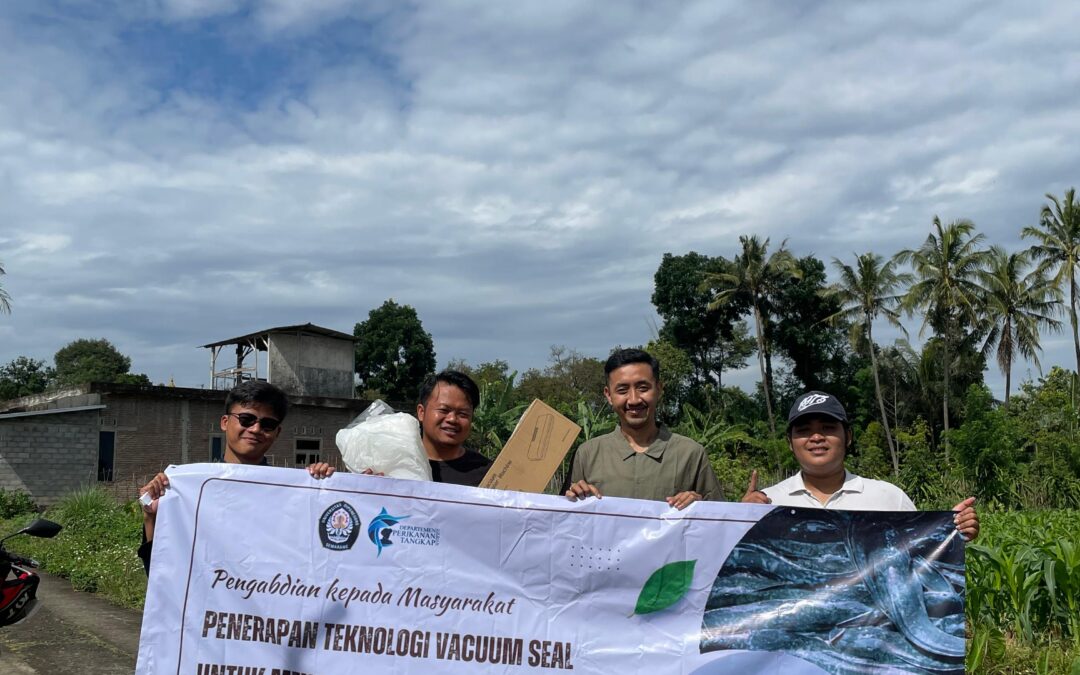Kendal (20/10), the Community Service Team from the Capture Fisheries Department, Faculty of Fisheries and Marine Science, Diponegoro University (UNDIP), carried out a program in Margosari Village, Limbangan District, Kendal Regency, introducing vacuum seal technology innovations to improve the shelf life and selling value of catfish products. This activity is a tangible effort by the university to bridge campus research results with community needs, particularly in the freshwater aquaculture sector, which serves as the economic backbone for residents of Margosari Village.
Margosari Village is a village located at the foot of Mount Ungaran with a population of around 2,600 people. Its strategic location and abundant water resources make the area suitable for freshwater fish farming, especially catfish and tilapia. Through the Fish Farmers Group (Pokdakan) Sido Rukun, the community has successfully developed catfish farming on village-owned land, with productivity reaching around 1 quintal per pond per cycle. However, behind this great potential, the farmers still face a classic problem: low selling prices due to dependence on middlemen. Harvested products are often sold directly without processing, resulting in low economic value and short shelf life.
In response to this challenge, the service team consisting of Hendrik Anggi Setyawan, M.Si. (Team Leader), Bogi Budi Jayanto, M.Si., and Siti Oftafia Wijayanti, M.Si., introduced vacuum seal technology as an innovative solution for post-harvest catfish processing. This technology works by removing air from the packaging before sealing, thereby inhibiting the growth of microorganisms and slowing down oxidation reactions, which are the main causes of quality degradation in fish. As a result, vacuum-sealed catfish can last longer, remain fresh, and have the potential to be sold at a higher price. “By implementing simple technologies such as vacuum sealing, the community can sell fish as ready-to-market processed products, not just as raw materials. This will expand the market and increase the income of fish farmers,” said Hendrik Anggi Setyawan, as the Head of the Service Team.
This community service program was carried out over three months through a series of activities, including outreach, counseling, training on the use of vacuum seal machines, assistance with implementation, as well as monitoring and evaluation. In the initial stage, the team conducted counseling and outreach to members of Pokdakan Sido Rukun regarding the importance of post-harvest processing and the potential to increase the selling value of their products. Participants were given an understanding of the working principles of vacuum sealing, its benefits for product shelf life, and its impact on product quality. Next, hands-on training and demonstrations on the use of the vacuum seal machine were conducted, allowing participants to practice independently. The community service team also provided a vacuum seal machine unit to the fish farmers group as a pilot tool, accompanied by usage and maintenance guidelines.

Pokdakan Sido Rukun
After the implementation of vacuum seal technology, fish farmers began to notice a significant difference. Catfish that previously could only be sold fresh can now be stored for longer periods without losing quality. This has opened up new opportunities for farmer groups to market their products to a wider market. According to Bogi Budi Jayanto, this technology not only extends shelf life, but also serves as an economic empowerment strategy for village fishing communities. “With simple yet effective innovations, we hope the community can become more independent and competitive economic players,” he said. Meanwhile, Siti Oftafia Wijayanti added that this activity also improves post-harvest technology literacy among fish farmers. “The community not only learns how to use the equipment, but also understands aspects of food safety and product quality, which are the keys to competing in the market,” she stated.
Through this activity, the UNDIP Service Team hopes that Margosari Village can become a model of an innovative fisheries village, where technology is applied to improve community welfare. In addition, this activity serves as a concrete manifestation of Diponegoro University’s commitment to supporting the Sustainable Development Goals (SDGs), particularly in the areas of poverty alleviation, food security, and rural economic development. This Community Service Activity (PkM) is part of the implementation of the Tri Dharma of Higher Education, in which lecturers and students of Diponegoro University actively participate in transferring knowledge and technology to the community to enhance welfare and the sustainability of local enterprises.
Editor: Hendrik A.S.



Recent Comments